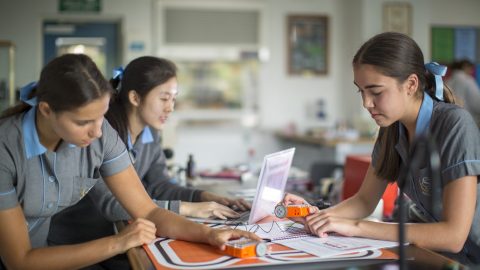Digital Distractions

This Term, St Catherine School’s Years 7 and 9 Heads of Year, Ms Kanako Yokouchi and Ms Fiona Ganino-Day, respectively, shared their reflections of a professional learning seminar they attended earlier this year. Presenter and educational specialist, Jill Sweatman’s research The Two Deadly D’s – Device and Distractions provided a confronting account of digital distractions and the impact of technology. The seminar proved to be a timely reminder of the negative effects of poorly managed devices in the hands of children and adolescents.
Sweatman describes the rise of a generation of firsts, youth who are touch and sleep deprived, thus creating what she calls ‘ghosts in the classroom’. In addition to a dramatic increase of myopia, with an expected 22 million people diagnosed with myopia in Australia and New Zealand by 2050 (55 years of age for our current Prep students).
The rising phenomenon known as the ‘Switch Cost Theory’ was also explained, describing the delayed cognition (mental processes) when people try to perform more than one task at a time. The brain has a notable cost every time it is distracted:
- 73% respond to distraction immediately regardless of whether necessary
- It takes 23 minutes on average to return and be focused on the task
- Forgetting to return to the original task occurs 25% of the time
- Interruptions occur 20 times per hour, of which four may be significant
- The brain also does not differentiate between virtual and reality.

Research shows motor vehicle accidents are four times more likely within five minutes of using a mobile phone.
Thus, multitasking may seem efficient on the surface but may actually take more time in the end and involve more error. Even brief mental blocks created by shifting between tasks can cost as much as 40 percent of someone’s productive time. The implications for this are undoubtedly wide reaching for young people and adults alike.
The use of mobile phones whilst driving is now a significant cause of traffic accidents. The ease of which girls check media messages whilst attempting to study or complete homework tasks requiring focus and attention is also known to be detrimental to establishing good study habits. Preparing the brain to concentrate for extended periods of time, for example the three hour VCE English exam, can only be hampered by continual digital distractions.
I invite parents this Term to maintain the dialogue at home with regard to their daughter’s use of technological devices. Without doubt, they need your assistance in managing effective study habits without the phone on their desk.
Interestingly, Monash University Associate Professor, Michael Henderson, who is researching digital distractions in schools and universities, is actually opposed to a smartphone ban. Despite this view, his research had also revealed a link between personal devices such as mobile phones to a diminished attention span, ability to retain information and overall academic performance. Henderson comments that technology is a wonderful resource and communication device but needs to be used in moderation, “We shouldn’t be banning the possession of phones but should be working with the students to look at when it is effective and for what purposes.”





